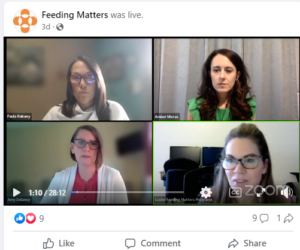NEWS FROM THE PFD ALLIANCE
Published by Feeding Matters on May 26, 2023
A Deeper Look at the 2023 PFD Alliance Symposium with Feeding Matters Pillar Chairs:
Education Pillar Chair-Amy L. Delaney, PhD, CCC-SL
Question:
I love the ARFID vs PFD diagnoses infographic. I work with children with autism and struggle to articulate where they would fall diagnostically. Are autistic children with feeding struggles classified as having PFD or ARFID? And is it under medical domain or another domain?
Answer:
A child with autism would qualify for a diagnosis of PFD under the medical and psychosocial domains, the medical domain given the neurodevelopmental disorder and, psychosocial assuming there is restricted eating. The child may also qualify under the nutrition domain if the diet is limited and causing growth or nutrition deficiencies. The same child with nutrition and psychosocial dysfunction would qualify for ARFID but only if medical and feeding skill dysfunction have been ruled out.
Family Support Pillar Chair-Amber Mieras
Question:
What wins have you seen in insurance coverage for PFD?
Answer:
We have been very lucky with our insurance coverage for my son Jax; however, at times it has taken months of calling the insurance companies every few days, taking detailed notes, and educating and pleading with insurance representatives. They all wanted to help but lacked information regarding Jax and his specific needs. In the last few years, our insurance company has assigned us a specific group or representative to create consistency and provide knowledge of our particular needs and circumstances. This has made a huge difference. I now feel like I have someone from the insurance company on my team who knows our story. We have been able to get changed to a blended food formula for Jax’s feeds, we have been able to qualify for various feeding programs, and we have received consistent approval for feeding therapy over the years.
Research Pillar Chair- Paula Rabaey Ph.D., MPH, OTR/L
Question:
How would professionals and families officially diagnose PFD or advocate for the PFD diagnosis if they live in a country where PFD is not part of the ICD?
Answer:
This is a very interesting and important question that does not have an easy answer! I am going to answer from my experiences in low- and middle-income countries where there are either no or very few OTs or SLPs. An important starting point is with physicians who work with children with disabilities. It is important to remember that medical and rehabilitation professions in the international community may have different education than we have in the US or Europe, so it’s not a matter of ignoring the diagnosis, they just may have never heard of it OR they realize the child has many problems with eating and nutrition but do not know how to help. The same for therapists-they hunger for this knowledge as it was not part of their education. It starts with advocacy and awareness on a global level. PFD needs to be recognized as a global health problem, not just a high-income country problem. OT has a World Federation of Occupational therapy as does SLP, which may be a great starting point for awareness. Bringing this to international conferences is also important.
Visit our Facebook page to see the Q & A on our timeline.
